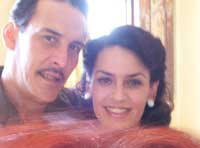March 12, 2006
Sex, guilt and the spirit

Joel del Río
http://www.jrebelde.cu/2006/enero-marzo/mar-12/cultura_sexo.html
A CubaNews translation. Edited by Walter Lippmann
Juventud Rebelde
March 12, 2006
Sex,
guilt and the spirit

Joel del Río
http://www.jrebelde.cu/2006/enero-marzo/mar-12/cultura_sexo.html
A CubaNews translation. Edited by Walter Lippmann
Many
outstanding creators agree that, other than cinema, art's three big topics are
sex, death and the spirit. Mata, que Dios perdona (Kill, for God
forgives), a Cuban digitally-videotaped fiction film made in 2004 by
first-time director Ismael Perdomo and released this month in the theater 23
y 12, indirectly recreates the first two in a bizarre plot studded with
extreme, violent situations, squalid atmospheres and marginal, entirely
unprincipled characters.
An offshoot of ICAIC (Cuban Film Institute)'s new policies to encourage low-budget productions, this motion picture, whose postproduction was largely made in Mexico, this whodunit ranks as one of Cuban cinema's first thrillers as it presents a game of intrigues and crime-based suspense amid the characters' ambiguity and non-stop swinging between sin and guilt, hatred and deception. Two women, (Broselianda Hernández and Sheril Zaldívar) are involved in a man's death (Jorge Alí), who can't stand old age and its aftermath of tiredness and impotence. He is indebted to a couple of criminals (Mario Limonta and Raúl Pomares) who are stalking him; and there's also one of the said women's jealous, machista, cuckolded and industrious husbands (Rafael Lahera, see the above photograph). Only at the end, when almost every trace of the last 24 hours' events (which account for most of the film) has disappeared, will the truth be revealed.
Actually, unassisted by a saving summary which a good synopsis could have provided, we find it hard at times to follow the said events and thus drift apart, due perhaps to a dull script that gives no hint as to the main characters' purposes and the story's shortsighted attention to the cause-and-effect chain no thriller can do without. However, Ismael took a risk in his first delivery by building a complex structure of flashbacks we must carefully observe, lest we get confused about what happened before or after the unruly spatio-temporal compositions proposed by the author and scriptwriter. Add to the above the frequent changes of perspective (or focalization, in narrative speech), since the scaremongering story that involves these four characters is told in various versions by more than one character, in a sort of Rashomon-meets-Memento, which messed things up for the director, who will surely be more on top of things in his future offerings.
Although many maintain after a century of discussions that filmmaking is just a means of telling stories, we have here a good reason to qualify such a statement. Plotwise, Mata, que Dios perdona shows a few flaws now and then (saying errors would be more like it, taking into account its links with a quintessentially generic and narrative cinema), but airtight mastery in other areas of good moviemaking practice, its entangled script notwithstanding. Rafael Solís's photographic work is remarkable, as is the selection and use of locations to depict this decadent, somber ambiance (the film is mostly shot indoors), all of which inspires and highlights a topnotch cast's absolute naturalism.
 Director
Ismael Perdomo seems to have demanded from his actors a performing style based
on a frankness that verges on obscenity and full-blown realism, a challenge made
worse when off-and-on most characters stretch things out through fits of hatred
or violence, fear or remorse. His film achieved a nice even quality level with
next to no cracks in its tone nor a mere falloff in rhythm.
Director
Ismael Perdomo seems to have demanded from his actors a performing style based
on a frankness that verges on obscenity and full-blown realism, a challenge made
worse when off-and-on most characters stretch things out through fits of hatred
or violence, fear or remorse. His film achieved a nice even quality level with
next to no cracks in its tone nor a mere falloff in rhythm.
Atop Ismael's accomplishments is first having convinced and then used to the max that monster (and I stress the positive Cuban sense of this term) called Broselianda Hernández, magnificent in many plays of days past but away from the stage after her brief, if masterly, role in Barrio Cuba. Once I saw her fabulous splitting capacity and the infinite nuances of her transitions, vocal and facial expressions I harbor no doubts as to her ranking, as of this minute, among Cuba's best contemporary actresses. Excellent as counterparts were newcomer Cheril Zaldívar and another sure-fire, Rafael Lahera. Truth be told, the film pays much more attention to the two women's actions and reactions than it does Lahera's and Alí's characters. They are potentially interesting but barely given a chance to show off through their nuances, conflicts and capabilities.
To use the words of its director himself, Mata, que Dios perdona is "realistic filmmaking besieged by daily naturalness (even if the action unfolds in the late 1950s) with common people who speak, drink, have sex, betray, sleep... it's an attempt to reproduce the pleasure of sex and death... maybe a thriller, or a drama underpinned by insolence, or both".
All those interested in Cuban cinema today, those who love to foretell and predict the future of our audiovisual panorama, must go see this unusual Cuban movie, a little rustic in its excesses (though it's worth wondering how much we'll have to suffer from so much good-for-nothing prudishness and goldbricking now, when some say to be appalled at the current soap opera or films like this one) but deserving of its own audience amidst those who like to call a spade a spade, peek from time to time at the dark side of moon, and put aside any sign of hypocrisy when approaching two of art's big issues: sex and death, haloed with guilt and sin with no relief or redemption whatsoever. Leave it to fairy tales and appeasing, noncommittal TV programs to present sweetening lies.
|
||||||||||||||||||||||||||||||||||||||||||||||||||||||||||||||||||||||||||||||||||||||||||||||||||||||||||||||||||||||||||||||||||||||